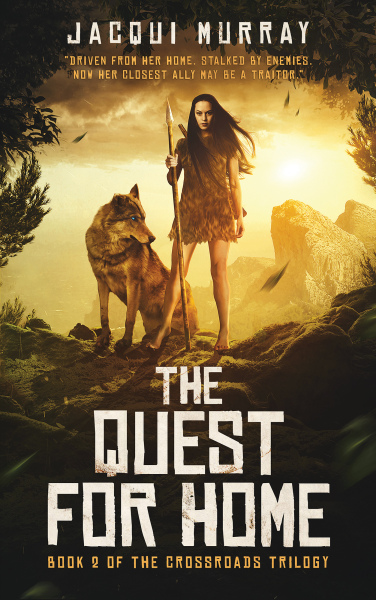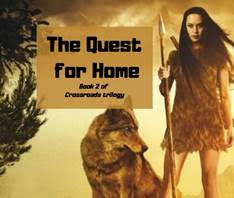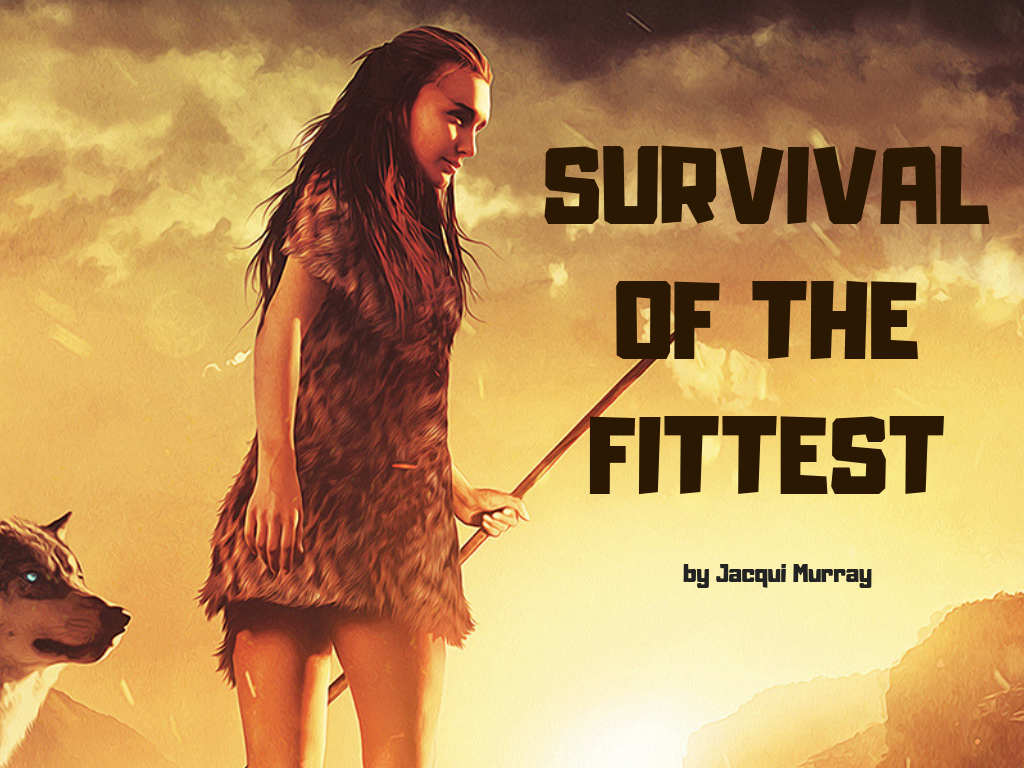Yesterday I re-blogged Jacqui Murray’s post about Prehistoric Fiction. Today it’s her new release taking centre stage.

Driven from her home. Stalked by enemies. Now her closest ally may be a traitor.
Chased by a ruthless and powerful enemy, Xhosa flees with her People, leaving behind her African homeland, leading her People on a grueling journey through unknown and perilous lands. As they struggle to overcome treachery, lies, danger, tragedy, hidden secrets, and Nature herself, Xhosa must face the reality that her most dangerous enemy isn’t the one she expected. It may be one she trusts with her life.
The story is set 850,000 years ago, a time in prehistory when man populated Eurasia. He was a violent species, fully capable of addressing the many hardships that threatened his survival except for one: future man, the one destined to obliterate any who came before.
Based on a true story, this is the unforgettable saga of hardship and determination, conflict and passion as early man makes his way across Eurasia, fleeing those who would kill him. He must be bigger-than-life, prepared time and again to do the impossible because nothing less than the future of mankind is at stake.

Book information:
Title and author: The Quest for Home by Jacqui Murray
Series: Book 2 in the Crossroads series, part of the Man vs. Nature saga
Genre: Prehistoric fiction
Available at: Kindle US Kindle UK Kindle CA Kindle AU
Jacqui answers some Questions
1. How did early man tell time?
Early man didn’t care about hours or minutes. What drove him was how much sunlight remained before he must return to wherever he would be sleeping that night (maybe a cave, a cliff wall, or behind a thistle barrier). As a result, they indicated time in the future by pointing to a place in the sky where the sun would eventually reach. He might say, “Return by this point” to mean, “Return when Sun reaches this point in the sky.”
2. What does a ‘hand of Sun’s travel’ mean?
A ‘hand’ quantifies the amount of time it takes Sun to travel the distance of a hand held up to the sky. A finger would be about fifteen minutes and an hour about four fingers, or a hand. This is one of the ways the earliest People measured the passage of time. Test it yourself. Hold a finger up next to the Sun. It will take about fifteen minutes for the Sun to reach the far side of your finger.
3. Why are these characters so violent?
The answer to this question is simple: They had to be. If Homo erectus hadn’t been violent 850,000 years ago, he—and we as a species—wouldn’t have survived. Man wasn’t yet the apex predator. Our skin was too thin, claws too short, and teeth useless for defense. What we did have that those who preyed on us didn’t was a thoughtful brain (well, the beginnings of one).
Jacqui will be visiting blogs September 16th-30th to chat about The Quest for Home. Some of the questions she’ll cover:
- How do you know these people are as smart as they seem?
- Their speech is too sophisticated.
- Convince me they can communicate as well as it sounds like they do with just gestures, hands, and facial movements.
- Could primitive man build rafts as suggested in this story?
- Was there really a giant upright primate like Giganto (Zvi’s friend)?
- What does ‘strong’ and ‘weak’ side mean?
- How did early man tell time?
- What does a ‘hand of Sun’s travel’ mean?
- Why are these characters so violent?
- I am not reading these books in order. Does it matter?
- Could Xhosa (the main character of The Quest for Home) really have traveled with a wolf companion?
- The Quest for Home hints at a spiritual side to man. Is that accurate?
- This is part of a series. What’s that about?
- How does the trilogy Dawn of Humanity tie into the trilogy Crossroads?
- What’s the relationship between Xhosa (and Homo erectus) and animals?
- What one characteristic would you say allowed Xhosa to survive in a world populated with Sabretooth cats, violent volcanoes, and predatory species who liked to eat man?
The schedule from September 16th-30th of who Jacqui will visit and the question number (from the list above) she’ll answer are here:
https://worddreams.wordpress.com/2019/09/16/qfh-book-launch/

Author bio:
Jacqui Murray is the author of the popular Building a Midshipman, the story of her daughter’s journey from high school to United States Naval Academy, the Rowe-Delamagente thrillers, and the Man vs. Nature saga. She is also the author/editor of over a hundred books on integrating tech into education, adjunct professor of technology in education, blog webmaster, an Amazon Vine Voice, a columnist for NEA Today, and a freelance journalist on tech ed topics. Look for her next prehistoric fiction, In the Footsteps of Giants, Winter 2020, the final chapter in the Crossroads Trilogy.
Social Media contacts:
Amazon Author Page: https://www.amazon.com/Jacqui-Murray/e/B002E78CQQ/
Blog: https://worddreams.wordpress.com
Instagram: https://www.instagram.com/jacquimurraywriter/
LinkedIn: http://linkedin.com/in/jacquimurray
Pinterest: http://pinterest.com/askatechteacher
Twitter: http://twitter.com/worddreams
Website: https://jacquimurray.net

Excerpt:
Northern shore of what we now call the Mediterranean Sea
Pain came first, pulsing through her body like cactus spines. When she moved her head, it exploded. Flat on her back and lying as still as possible, Xhosa blindly clawed for her neck sack with the healing plants. Her shoulder screamed and she froze, gasping.
How can anything hurt that much?
She cracked one eye, slowly. The bright sun filled the sky, almost straight over her head.
And how did I sleep so long?
Fractured memories hit her—the raging storm, death, and helplessness, unconnected pieces that made no sense. Overshadowing it was a visceral sense of tragedy that made her shake so violently she hugged her chest despite the searing pain. After it passed, she pushed up on her arms and shook her head to shed the twigs and grit that clung to her long hair. Fire burned through her shoulders, up her neck and down her arms, but less than before. She ignored it.
A shadow blocked Sun’s glare replaced by dark worried eyes that relaxed when hers caught his.
“Nightshade.” Relief washed over her and she tried to smile. Somehow, with him here, everything would work out.
Her Lead Warrior leaned forward. Dripping water pooled at her side, smelling of salt, rotten vegetation, mud, and blood.
“You are alright, Leader Xhosa,” he motioned, hands erratic. Her People communicated with a rich collection of grunts, sounds, gestures, facial expressions, and arm movements, all augmented with whistles, hoots, howls, and chirps.
“Yes,” but her answer came out low and scratchy, the beat inside her chest noisy as it tried to burst through her skin. Tears filled her eyes, not from pain but happiness that Nightshade was here, exactly where she needed him. His face, the one that brought fear to those who might attack the People and devastation to those who did, projected fear.
She cocked her head and motioned, “You?”
Deep bruises marred swaths of Nightshade’s handsome physique, as though he had been pummeled by rocks. An angry gash pulsed at the top of his leg. His strong upper arm wept from a fresh wound, its raw redness extending up his stout neck, over his stubbled cheek, and into his thick hair. Cuts and tears shredded his hands.
“I am fine,” and he fell silent. Why would he say more? He protected the People, not whined about injuries.
When she fumbled again for her neck sack, he reached in and handed her the plant she needed, a root tipped with white bulbs. She chewed as Nightshade scanned the surroundings, never pausing anywhere long, always coming back to her.
The sun shone brightly in a cloudless sky. Sweltering heat hammered down, sucking up the last of the rain that had collected in puddles on the shore. Xhosa’s protective animal skin was torn into shreds but what bothered her was she couldn’t remember how she got here.
“Nightshade, what happened?”
Her memories were a blur—terrified screams and flashes of people flying through the air, some drowning, others clinging desperately to bits of wood.
Nightshade motioned, slowly, “The storm—it hit us with a fury, the rain as heavy and fierce as a waterfall.”
A memory surfaced. Hawk, the powerful leader of the Hawk People, one arm clutching someone as the other clawed at the wet sand, dragging himself up the beach.
He was alive!
It was Hawk who offered her People a home when they had none, after more than a Moon of fleeing for their lives through lands so desolate, she didn’t know how anyone survived. Finding Hawk and his People, she thought she’d found a new homeland.
Her last hunt with Hawk flashed through her mind—the stone tip they created like the Big Head’s weapon, how she had hung by her ankles from a tree trunk to cross a deep ravine. How he grinned when she reached the other side, chest heaving but radiant with satisfaction. He told her many of his warriors shook with fear as they crossed. His pride in her that day glowed like flames at night.
For the first time in her life, she felt Sun’s warmth inside of her.
She looked around, saw quiet groups huddled together, males talking and females grooming children. Pan-do bent over a child, whispering something in her ear but no Hawk.
Where is he? But she didn’t ask Nightshade. The last time she’d seen the two together, they had fought.
She couldn’t imagine a world without Hawk. They had planned to pairmate, combine their groups into one so strong no one could ever again drive her away. She hadn’t known there were enemies worse than Big Heads until Hawk told her about the Ice Mountain invaders. They attacked Hawk’s People long before Xhosa arrived. Hawk had killed most and chased the rest back to their home, icy white cliffs that extended from Sun’s waking place to its sleeping nest, bereft of plants and animals. When he saw where they lived, he understood why they wanted his land.
The children of those dead invaders grew up and wanted revenge.
Someone moaned. She jerked to find who needed help and realized it was her. She hoped Nightshade didn’t hear.
He glanced at her and then away. “All the rafts were destroyed.”
She shook, trying to dislodge the spider webs in her brain. Hawk’s homebase was squashed between a vast stretch of open land and an uncrossable pond. They should have been safe but the Ice Mountain invaders attacked in a massive horde. Her People—and Hawk’s—were driven into the water. The rafts became their only escape. Floating on a log platform to the middle of a pond too deep to walk across was something no one had ever done but they must or die. The plan was the rafts would carry the People to safety, away from the Invaders.
That hadn’t worked.
“There were too many enemy warriors, Xhosa,” and Nightshade opened and closed his hands over and over to show her. “More than I have ever seen in one place.”
Images of warclubs slashed through her thoughts, flying spears, the howls of warriors in battle. Many died, beaten until they stopped moving, children dragged screaming from mothers. The giant female—Zvi—sprinting faster than Xhosa thought someone her size could, the children El-ga and Gadi in her arms, a spear bouncing off her back. Her size stunned the enemy, immobilized them for a breath which gave Zvi the time she needed to reach safety.
Almost to himself, Nightshade motioned, “I’ve never seen him this brave.”
Xhosa didn’t understand. “Him?” Did he mean Zvi?
“Pan-do. His warriors attacked. They saved us.” Nightshade locked onto the figure of Pan-do as he wandered among the bedraggled groups, settling by an elder with a gash across his chest and began to minister to the wound.
“I remember,” Xhosa murmured. When the People were trapped between the trees and the water, prey waiting to be picked off, Pan-do’s warriors pounced. That gave Xhosa precious time to push the rafts out onto the water. It seemed none of the enemy knew how to swim. Pan-do sliced through the Ice Mountain invaders without fear, never giving ground.
Nightshade motioned, “He isn’t the same Leader who arrived at our homebase, desperate for protection, his People defeated.”
Xhosa’s hands suddenly felt clammy. “Is Lyta alive?”
Since the death of his pairmate, before Xhosa met him, Pan-do’s world revolved around his daughter, Lyta. He became Leader of his People to protect her. When he arrived at the People’s homebase, Lyta stood out, unusual in an otherwise homogenous group. First, it was her haunting beauty, as though she shined from within, her hair as radiant as Sun. Awe turned to shock when she walked, her gait awkward on malformed feet. She should have been destroyed as a child but Pan-do said he had never considered it. He explained that in Moons of migration, before joining Xhosa’s People, Lyta had never slowed them down. He didn’t expect that to change if the two groups traveled together.
And then she spoke. Her voice was like bird’s song and a gift to People exhausted from the day’s work. It cheered up worried adults and put smiles on the faces of children, its melodic beauty convincing them that everything would work out.
It was more than a Moon after his arrival before Pan-do told Xhosa what he valued most about his daughter. Lyta could see truth simply by watching. No one could hide a lie from her, and she never hid it from her father. Pan-do kept it secret because the people it threatened might try to silence her. He only told Xhosa because Lyta had witnessed a conversation about a plan to kill Xhosa.
One of the people Lyta didn’t recognize but the other, he was someone Xhosa trusted.
When Nightshade nodded, Yes, Lyta lives, Xhosa relaxed but only for a moment.
“Sa-mo-ke?”
Nightshade nodded toward a group of warriors. In the middle, eyes alert and hands energetic, stood Sa-mo-ke.
She sighed with relief. Pan-do’s Lead Warrior was also Nightshade’s greatest supporter outside of the People. When he first arrived, Sa-mo-ke spent Moons mimicking her Lead Warrior’s fighting techniques until his skill became almost as formidable as Nightshade’s with one critical difference. While Nightshade liked killing, Sa-mo-ke did so only when necessary.
Nightshade motioned, “Escape came at a tremendous cost, Xhosa. Many died, the rafts were destroyed, and we are now stranded in an unfamiliar land filled with nameless threats.”
It doesn’t matter, she whispered to herself. We are good at migrating.
She jerked her head around, and then motioned, “Where’s Spirit?”
The loyal wolf had lived with people his entire life. He proved himself often while hunting, defending his packmates, and being a good friend. An image flitted across her mind, Spirit streaking toward the rafts, thrusting his formidable body like a spear through the shocked hordes. The enemy had never seen an animal treat People as pack. Then, the wolf swimming, paws churning the water into whitecaps, gaze locked onto Seeker. Endless Pond was too deep for him to touch the bottom so his head bobbed up and down, feet paddling like a duck’s as he fought to stay above the surface.
Nightshade gestured, “The attackers almost killed Spirit.”
She bit her lip, concentrating. “I remember Mammoth’s trumpets.”
The rare hint of a smile creased his mouth. “Another of Pan-do’s tricks. It saved Spirit and probably all of us. He brayed like a herd of Mammoth thundering toward the shoreline. The invaders fled for their lives.”
Pan-do is clever.
Nightshade grimaced. “But the storm worsened and the rafts foundered. Many of the People managed to cling to logs long enough to crash onto this shore. Then, they saved others. But many died.”
He opened and closed his hands to show how many.
A stillness descended as Nightshade’s gaze filled with a raw emotion he never showed. It shook Xhosa. Nothing frightened her Lead Warrior.
She gulped which hurt her insides. Shallow breaths worked better. Rolling to her hands and knees, she stood which made her head swim and she threw up.
Finally, the dizziness subsided and Xhosa asked, “Hawk?”
Nightshade peered around, hands fidgeting. He examined something on the ground, toed it with his foot. “When the tempest destroyed the rafts, he dragged many to shore, to safety. The last time, he did not return. I tried to find him.”
Soundless tears dampened her face. Nightshade touched her but Xhosa focused on a trail of ants and a worm burrowing into the soft earth. Her vision dimmed and she stumbled, fell, and then crawled, happy for the pain that took her mind off Hawk. When she forced herself up, everything blurred but she inhaled, slowly, and again, until she could finally see clearly.
How dare Hawk die! We had plans. Xhosa shoved those thoughts away. Later was soon enough to deal with them.
“His People—do they know?”







